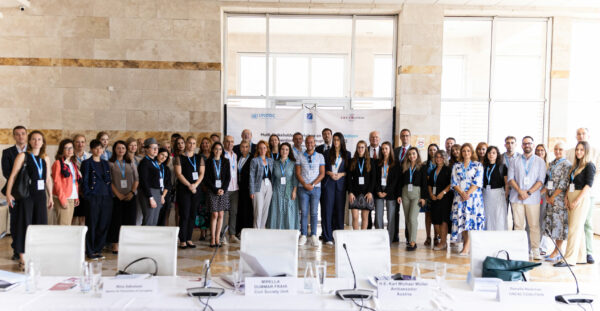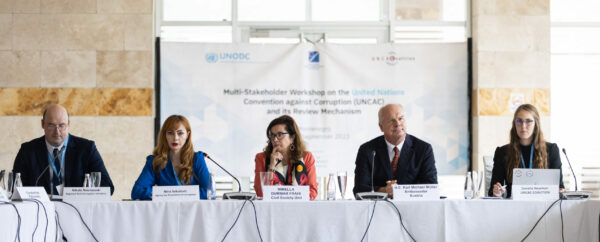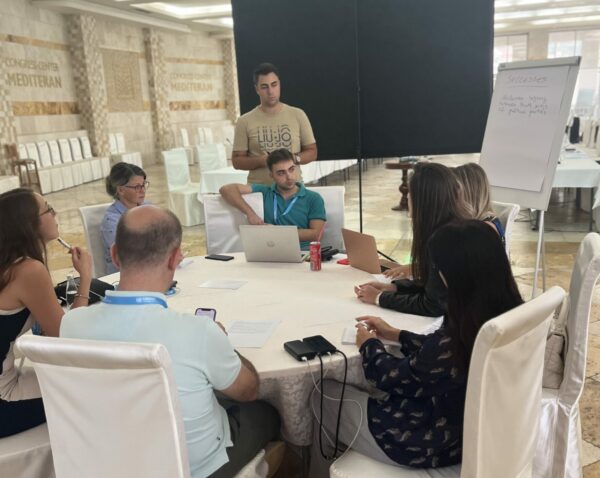2 October 2023 –

How is civil society in the Western Balkans involved in the ongoing development of new anti-corruption strategies? How can we combat the phenomenon of state capture? What should be done when new corruption risks arise despite risk management measures?
These were some of the questions addressed at the regional three-day Multi-Stakeholder workshop on the United Nations Convention against Corruption (UNCAC) and its Review Mechanism in Montenegro, held on 19-21 September 2023 in Montenegro. The workshop, organized by the UNODC Civil Society Unit (CSU) and Regional Anti-Corruption Initiative (RIA), in cooperation with the UNCAC Coalition and with support from the Austrian Development Cooperation (ADC), brought together stakeholders from civil society, the private sector, as well as government officials from Albania, Bosnia and Herzegovina, Montenegro, North Macedonia, Serbia and Kosovo.
UNCAC Coalition Project Manager Danella Newman gave insightful remarks during the opening ceremony, highlighting the importance of the UNCAC review process as a door-opener for collaboration between civil society, governments and other actors, as well as the need for states to be more transparent and involve non-governmental stakeholders in a meaningful way. Furthermore, she encouraged governments present who had not yet done so to sign the UNCAC Coalition’s Transparency Pledge, and highlighted the value of civil society parallel reports on UNCAC implementation in providing a crucial independent perspective on the implementation of UNCAC provisions in law and practice.

After training sessions by UNODC on UNCAC articles under Chapter II (preventive measures) and V (asset recovery), participants shared their experiences with fighting against corruption, advocating for higher standards of transparency and participation in their work, and discussed recommendations to improve UNCAC implementation in their countries.
Danella Newman and Denyse Degiorgio from the UNCAC Coalition led the civil society day of the workshop, presenting our tools to assist CSOs in understanding the review process in their respective countries, discussed challenges in UNCAC implementation from a civil society perspective and how civil society can engage in the UNCAC Implementation Review Mechanism, and provided a brief overview of the UNCAC CoSP fora. Our tools for transparency and civil society participation in the UNCAC include:
- The Transparency Pledge – North Macedonia, Montenegro and Albania signed our Pledge; we encourage Bosnia & Herzegovina and Serbia to do so as well.
- The Guide to Transparency and Participation in the UNCAC Implementation Review Mechanism, which identifies the multiple concrete steps that States Parties can take throughout the review process to ensure that it becomes transparent and inclusive, and consequently robust, legitimate and effective.
- Civil Society Parallel Reports – we have recently published reports on UNCAC implementation in Albania, Bosnia & Herzegovina, Montenegro and Serbia. An independent parallel report on North Macedonia was published in 2019.
- The Access to Information Campaign – several CSOs from countries in the region have participated in the campaign to varying degrees of success in obtaining relevant information. See our results here!
- The UNCAC Review Status Tracker – Serbia’s UNCAC review country visit is upcoming on 25-27 October and we are organizing a briefing for CSOs interested in contributing. The country visit in Albania is also planned for this year. The UNCAC reviews in the other countries are (nearly) completed.

During interactive group discussions, members of civil society organizations and the private sector were invited to discuss challenges and best practices from their advocacy work in the anti-corruption field. Unsurprisingly, we identified common trends of a lack of implementation and enforcement of certain anti-corruption laws across the region but also celebrated each others’ successes in advancing transparency, the participation of youth, citizens and businesses in the fight against corruption and holding governments accountable.
Equipped with the relevant tools, participants will now take the next steps and are eager to become involved in UNCAC implementation and advocating for greater transparency and civil society participation in their country’s UNCAC reviews, and anti-corruption efforts more broadly.
Fullscreen Mode


